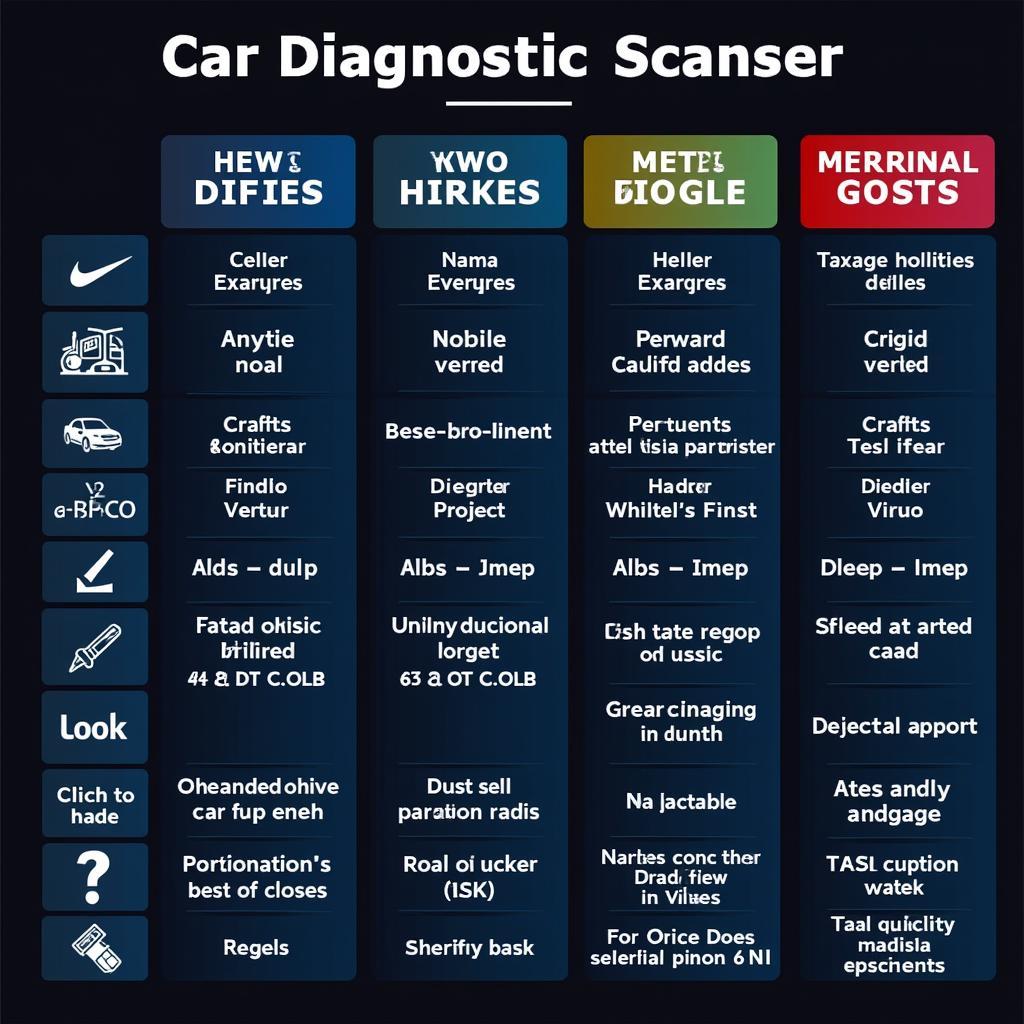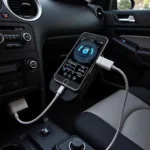Whether you’re a seasoned mechanic or a car enthusiast, having the right diagnostic scan tool can be a game-changer. Gone are the days of relying solely on intuition and experience to troubleshoot car problems. Today’s vehicles are complex machines, packed with sophisticated electronics that require equally advanced tools for accurate diagnosis and repair.
Why Invest in Diagnostic Scan Tools?
Diagnostic scan tools are essential for anyone who wants to understand, maintain, or repair modern vehicles. These tools provide a window into your car’s computer system, allowing you to:
- Read and clear trouble codes: The most basic function of a scan tool is to retrieve diagnostic trouble codes (DTCs) stored in your car’s computer. These codes act like digital breadcrumbs, pointing you towards the potential source of a problem.
- View live data streams: Imagine being able to see your engine’s RPM, coolant temperature, and oxygen sensor readings in real time. Diagnostic scan tools give you this ability, enabling you to monitor crucial parameters and identify anomalies as they happen.
- Perform advanced functions: Depending on the tool and vehicle, you might be able to perform tasks like actuator tests, key fob programming, or even reset service reminders – functionalities typically reserved for dealerships and specialized workshops.
Types of Diagnostic Scan Tools for All Cars
The market offers a wide array of diagnostic scan tools, each catering to different needs and budgets. Here’s a breakdown of the most common types:
1. Basic Code Readers:
- Ideal for: Car owners who want to understand basic engine codes and perform simple resets.
- Capabilities: Read and clear generic trouble codes (DTCs), often limited to engine-related issues.
- Pros: Affordable, user-friendly, compact.
- Cons: Limited functionality, may not provide in-depth information or access to all vehicle systems.
2. OBD-II Scanners:
- Ideal for: Car enthusiasts, DIY mechanics, and small workshops needing more comprehensive diagnostics.
- Capabilities: Read and clear generic and manufacturer-specific codes, view live data streams, perform some bi-directional controls.
- Pros: More features than basic code readers, offer good value for the price, widely compatible.
- Cons: Functionality can vary significantly between models, may not support all advanced functions on all vehicles.
3. Professional-Grade Scan Tools:
- Ideal for: Professional mechanics, dealerships, and specialized workshops requiring the most advanced diagnostics and repair capabilities.
- Capabilities: Extensive code reading and clearing, comprehensive live data streaming, advanced bi-directional controls, programming and coding functions, access to all vehicle systems.
- Pros: Unparalleled diagnostic power, comprehensive software suites, regular updates, expert support.
- Cons: High cost, require significant technical expertise, often brand-specific or limited in vehicle coverage.
“Choosing the right diagnostic scan tool is like selecting the right wrench – you need the appropriate tool for the job,” says John Anderson, a veteran automotive technician with over 20 years of experience. “Investing in a tool that matches your skill level and diagnostic needs will pay dividends in the long run.”
 Various Car Diagnostic Scanner Types
Various Car Diagnostic Scanner Types
Factors to Consider When Choosing a Diagnostic Scan Tool
Navigating the world of diagnostic scan tools can feel overwhelming. To make an informed decision, consider these factors:
- Your Budget: Diagnostic scan tools range from affordable code readers to high-end professional systems. Determine your budget before diving into specific features.
- Your Skill Level: Are you a DIY enthusiast or a seasoned mechanic? Choose a tool that aligns with your technical expertise.
- Vehicle Compatibility: Not all scan tools work with all car makes and models. Check for compatibility with your vehicle(s) before making a purchase.
- Software and Updates: Regular software updates are essential to ensure your scan tool stays current with the latest vehicle technologies.
- Features and Functionality: Identify the specific features you need, such as live data streaming, bi-directional controls, or special functions.
- User Interface and Ease of Use: Opt for a tool with an intuitive interface and user-friendly software that simplifies the diagnostic process.
Conclusion
Investing in the right diagnostic scan tools for all cars empowers you to take control of your vehicle’s health. From identifying simple issues to performing complex repairs, these tools provide the insights and functionalities needed to keep your car running smoothly. By understanding your needs, researching available options, and choosing wisely, you’ll be well-equipped to tackle any automotive challenge that comes your way.
